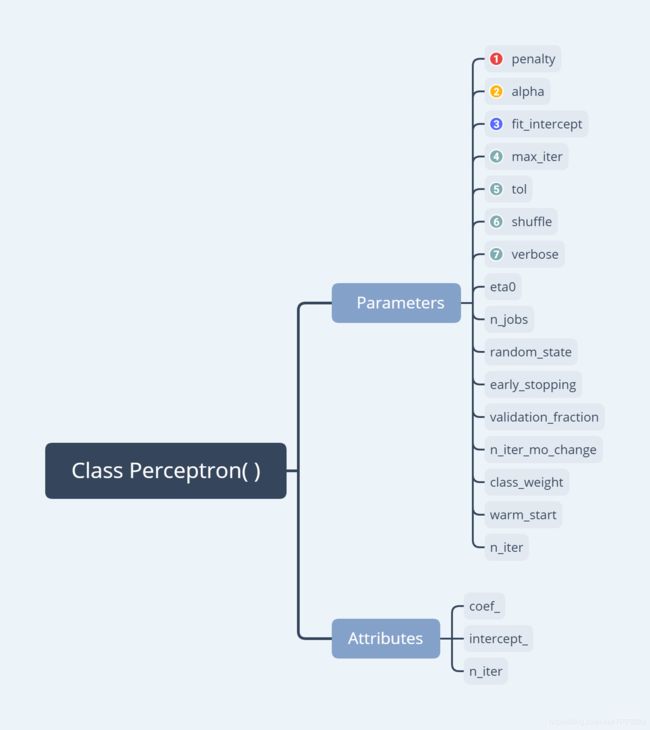from .stochastic_gradient import BaseSGDClassifier
class Perceptron(BaseSGDClassifier):
def __init__(self, penalty=None, alpha=0.0001, fit_intercept=True,
max_iter=None, tol=None, shuffle=True, verbose=0, eta0=1.0,
n_jobs=None, random_state=0, early_stopping=False,
validation_fraction=0.1, n_iter_no_change=5,
class_weight=None, warm_start=False, n_iter=None):
super(Perceptron, self).__init__(
loss="perceptron", penalty=penalty, alpha=alpha, l1_ratio=0,
fit_intercept=fit_intercept, max_iter=max_iter, tol=tol,
shuffle=shuffle, verbose=verbose, random_state=random_state,
learning_rate="constant", eta0=eta0, early_stopping=early_stopping,
validation_fraction=validation_fraction,
n_iter_no_change=n_iter_no_change, power_t=0.5,
warm_start=warm_start, class_weight=class_weight, n_jobs=n_jobs,
n_iter=n_iter)
参数列表概览

1. penalty
penalty : None, 'l2' or 'l1' or 'elasticnet'
The penalty (aka regularization term) to be used. Defaults to None.
2. alpha
alpha : float
Constant that multiplies the regularization term if regularization is
used. Defaults to 0.0001
3. fit_intercept
fit_intercept : bool
Whether the intercept should be estimated or not. If False, the
data is assumed to be already centered. Defaults to True.
4. max_iter
max_iter : int, optional
The maximum number of passes over the training data (aka epochs).
It only impacts the behavior in the ``fit`` method, and not the
`partial_fit`.
Defaults to 5. Defaults to 1000 from 0.21, or if tol is not None.
.. versionadded:: 0.19
5. tol
tol : float or None, optional
The stopping criterion. If it is not None, the iterations will stop
when (loss > previous_loss - tol). Defaults to None.
Defaults to 1e-3 from 0.21.
.. versionadded:: 0.19
6. shuffle
shuffle : bool, optional, default True
Whether or not the training data should be shuffled after each epoch.
7. verbose
erbose : integer, optional
The verbosity level
8. eta0
eta0 : double
Constant by which the updates are multiplied. Defaults to 1.
9. n_jobs
n_jobs : int or None, optional (default=None)
The number of CPUs to use to do the OVA (One Versus All, for
multi-class problems) computation.
``None`` means 1 unless in a :obj:`joblib.parallel_backend` context.
``-1`` means using all processors. See :term:`Glossary `
for more details.
10.random_state
random_state : int, RandomState instance or None, optional, default None
The seed of the pseudo random number generator to use when shuffling
the data. If int, random_state is the seed used by the random number
generator; If RandomState instance, random_state is the random number
generator; If None, the random number generator is the RandomState
instance used by `np.random`.
11. early_stopping
early_stopping : bool, default=False
Whether to use early stopping to terminate training when validation.
score is not improving. If set to True, it will automatically set aside
a fraction of training data as validation and terminate training when
validation score is not improving by at least tol for
n_iter_no_change consecutive epochs.
.. versionadded:: 0.20
12. validation_fraction
validation_fraction : float, default=0.1
The proportion of training data to set aside as validation set for
early stopping. Must be between 0 and 1.
Only used if early_stopping is True.
.. versionadded:: 0.20
13. n_iter_change
n_iter_no_change : int, default=5
Number of iterations with no improvement to wait before early stopping.
.. versionadded:: 0.20
14. class_weighe
class_weight : dict, {class_label: weight} or "balanced" or None, optional
Preset for the class_weight fit parameter.
Weights associated with classes. If not given, all classes
are supposed to have weight one.
The "balanced" mode uses the values of y to automatically adjust
weights inversely proportional to class frequencies in the input data
as ``n_samples / (n_classes * np.bincount(y))``
15. warm_stat
warm_start : bool, optional
When set to True, reuse the solution of the previous call to fit as
initialization, otherwise, just erase the previous solution. See
:term:`the Glossary `.
16. n_iter
n_iter : int, optional
The number of passes over the training data (aka epochs).
Defaults to None. Deprecated, will be removed in 0.21.
.. versionchanged:: 0.19
Deprecated
